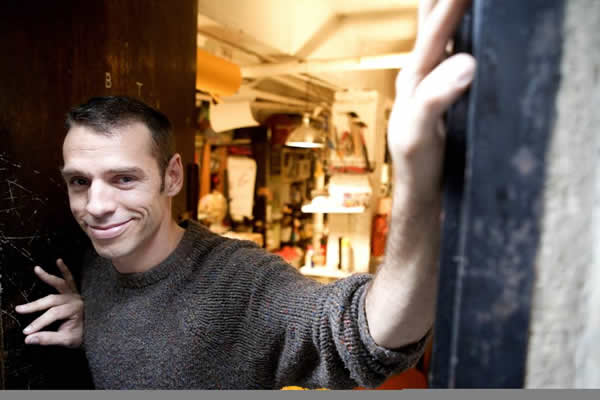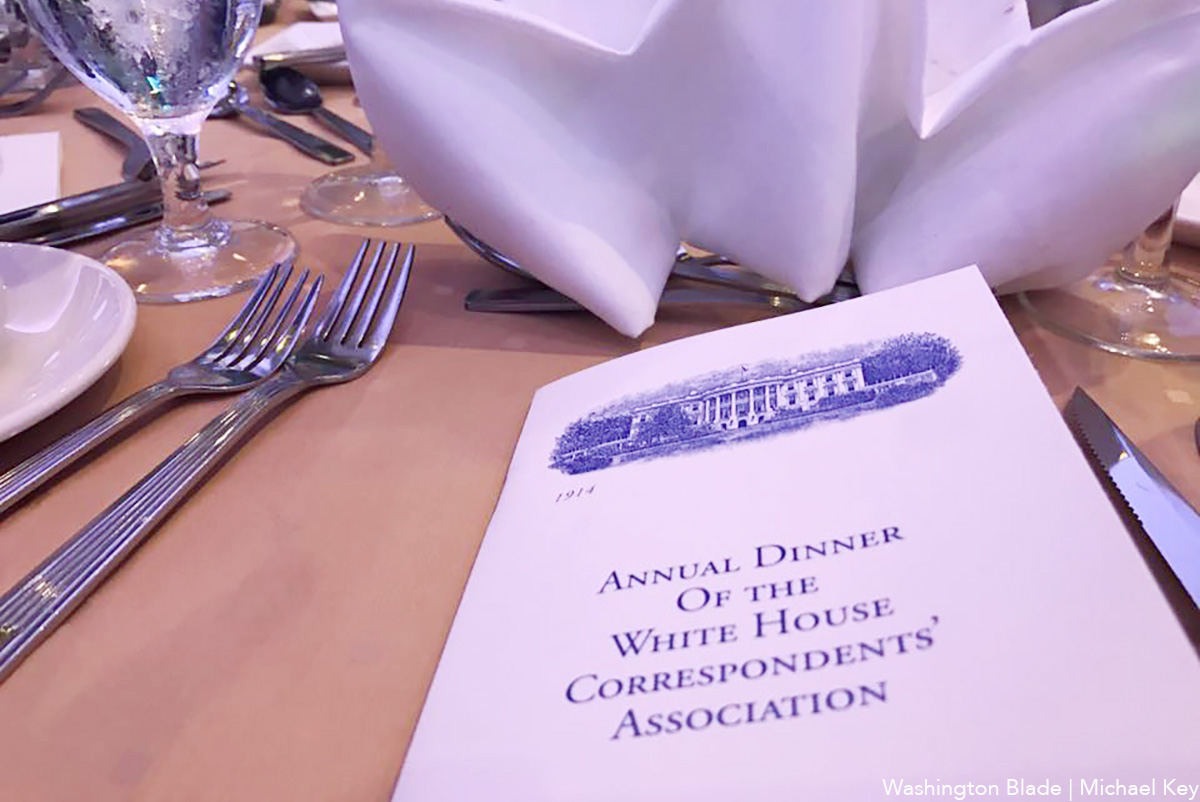Arts & Entertainment
A dash of Basil
Gay puppet innovator dazzles with local run

Basil Twist
‘Petrushka’
March 16-25
Shakespeare Theatre Company
Lansburgh Theatre, 450 7th Street, NW
$22.50-$50
202-547-1122

Puppeteer Basil Twist is having his work exhibited in several D.C. theaters in the coming weeks. (Image courtesy Shakespare Theater Co.)
Basil Twist’s work has been called superhuman, breathtaking and adored — not the usual words used to describe a puppet show. But then, Twist isn’t your usual puppeteer. His sophisticated approach to puppetry melds tradition with innovation and in the process takes the art form to new heights. Throughout March and April, four of his shows can be seen locally as part of “Twist Festival D.C.,” giving area audiences an opportunity to experience his magic.
The mini-fest kicks off at the Shakespeare Theatre Company with “Petrushka,” Twist’s take on the classic Russian ballet about a love triangle involving three puppets: the eponymous clown, a ballerina and a Moor. Originally commissioned for New York’s Lincoln Center in 2000, it’s a puppet show about puppets with music — Russian identical twins Irina and Julia Elkina play a reduction of Igor Stravinsky’s score on identical pianos.
And though he doesn’t perform in the show, Twist selected, trained and directed the unseen puppeteers who animate the 4-foot-tall puppets that he built. “Three puppeteers are required to operate one puppet. For me the puppet is the embodiment of a super human being,” Twist says. “The puppet ballerina soars. She can do things that a human being only wishes she could do.”
A third-generation puppeteer, Twist, who is gay and single, broke onto the scene in 1998 with his underwater, classical musical puppet show “Symphonie Fantastique” (with a festival production at Clarice Smith Performing Arts Center at the University of Maryland in College Park). He credits his training at France’s prestigious École Supérieure Nationale des Arts de la Marionnette with allowing him to think outside the traditional puppet box: “I was taught how puppetry fits into the larger world of art. It’s prompted me to collaborate and think larger and more ambitiously about the place of puppetry in the world.”
The festival’s other two productions are “Arias with a Twist,” his racy and riveting collaboration with New York cabaret and drag performer Joey Arias; and “Dogugaeshi,” a Japanese-inspired journey of images accompanied by original shamisen (Japanese lute) compositions performed by master musician Yumiko Tanaka (at Woolly Mammoth and Studio Theatre respectively).
“A good puppeteer is game, ready and willing to do whatever it takes,” says Twist, 41. “It’s not comfortable: A puppeteer must put his body in weird positions. I’ve tried to use dancers as puppeteers but because they’re so into their own bodies, they have a hard time translating movement into another object. Musicians who play guitar and piano have more success.”
Growing up in San Francisco, Twist played with puppets and made envied Halloween costumes. He loved the Muppets and dreamt of a career in puppetry or animation. He briefly attended Oberlin College where he quickly realized that Ohio undergrad life wasn’t for him. One day at the library he came across a book describing internships at the Center for Puppetry Arts in Atlanta. Instantly he realized, “That’s where I needed to be. It was crystal clear to me.” So Twist left school and moved to New York City, where he still lives. Freshly determined to become a professional puppeteer, he interned in Atlanta and later studied in France. Fortunately for him, “the puppet thing has worked out, because I can’t do anything else.”
Today, the award-winning puppeteer works in a funky Greenwich Village basement studio. And while he considers himself a downtown auteur — a niche he clearly relishes — who does his own puppetry and scenic design projects, Twist isn’t averse to accepting the occasional commercial commission. Recently he traveled to San Paulo, Brazil to tweak his puppets for “The Addams Family Musical” which he created for the original Broadway production. Before heading home, he flew to Rio for Carnival. Of course, Twist says, the party was good and guys were hot, but it was the nightly Samba school competition that impressed him most. “It was like the Super Bowl meets the Oscars meets Burning Man — truly an inspiring experience that I’ll never forget.”
So, can we expect an upcoming show that features hip-shaking, scantily costumed puppets? Maybe someday, but for now, Twist is working on his version of “The Rite of Spring,” another Russian ballet, again with music by Stravinsky.
When creating a new puppet show, Twist says, “I like to think of myself as an audience member. I want to be dazzled. I want it to be very athletic and fast. I want to ask ‘How did they do that?’”
Out & About
Drag Underground returns
Indiana Bones, Bombalicious Eklaver, Shi-Queeta Lee, Cake Pop! to perform

Dupont Underground and the Washington Blade have teamed up to host “Drag Underground” on Friday, April 26 at 7:30 p.m. at Dupont Underground.
Performers include Indiana Bones, Bombalicious Eklaver, Shi-Queeta Lee and Cake Pop.
Tickets start at $15 and can be purchased on Eventbrite.

The annual White House Correspondents’ Association Dinner is set for Saturday, April 27 at the Washington Hilton with Colin Jost serving as emcee.
President Biden is scheduled to speak and numerous celebrities are expected around D.C. all weekend for related parties and events.
The Washington Blade is the only LGBTQ outlet that is a member of the Association and is hosting a table of VIPs, including actor Billy Porter and Congressman Robert Garcia (D-Calif.).
“We look forward to the Dinner each year to celebrate our press freedoms and to thank a range of allies and supporters for their work on behalf of the LGBTQ movement,” said Blade Editor Kevin Naff.

Friday, April 26
Center Aging Monthly Luncheon with Yoga & Intergenerational Hangout will be at 12 p.m. at the DC Center for the LGBT Community. Chair yoga will be at noon. Lunch will be provided by the Gay Professional Men of Color at 1 p.m. Guests can bring a beverage of choice. For more information, email [email protected].
Go Gay DC will host “LGBTQ+ Social in the City” at 7 p.m. at Courtyard by Marriott Dupont Circle. This fun weekly event brings the DMV area LGBTQ community, including allies, together for delicious food and conversation. Attendance is free and more details are available on Eventbrite.
Trans Support Group will be at 7 p.m. on Zoom. This group is intended to provide emotionally and physically safe space for trans people and those who may be questioning their gender identity/expression to join together in community and learn from one another. For more details, email [email protected].
Saturday, April 27
Go Gay DC will host “LGBTQ+ Brunch” at 11 a.m. at Freddie’s Beach Bar & Restaurant. Attendance is free and more details are available on Eventbrite.
Sunday, April 28
AfroCode DC will be at 4 p.m. at Decades DC. This event will be an experience of non-stop music, dancing, and good vibes and a crossover of genres and a fusion of cultures. Tickets cost $40 and can be purchased on Eventbrite.
Go Gay DC will host “LGBTQ+ Dinner” at 6:30 p.m. at Federico Ristorante Italiano. This event is ideal for making meaningful new connections and community building or just to unwind and enjoy extended happy hour. Attendance is free and more details are available on Eventbrite.
Monday, April 29
Center Aging: Monday Coffee & Conversation will be at 10 a.m. on Zoom. This is a social hour for older LGBTQ adults. Guests are encouraged to bring a beverage of their choice. For more details, email [email protected].
Tuesday, April 30
Pride on the Patio Events will host “LGBTQ Social Mixer” at 5:30 p.m. at Showroom. Dress is casual, fancy, or comfortable. Guests are encouraged to bring their most authentic self to chat, laugh, and get a little crazy. Admission is free and more details are on Eventbrite.
“5th Tuesdays Open Mic” will be at 8 p.m. at Busboys and Poets at 14th Street, N.W. For two hours, audiences can expect a diverse chorus of voices and a vast array of professional spoken word performers, open mic rookies, and musicians. The event will be hosted by Charity Blackwell. Tickets cost $8 and can be purchased on Eventbrite.
Wednesday, May 1
Job Club will be at 6 p.m. on Zoom. This is a weekly job support program to help job entrants and seekers, including the long-term unemployed, improve self-confidence, motivation, resilience and productivity for effective job searches and networking — allowing participants to move away from being merely “applicants” toward being “candidates.” For more information, email [email protected] or visit thedccenter.org/careers.
Thursday, May 2
Virtual Yoga with Charles M. will be at 7 p.m. on Zoom. This is a free weekly class focusing on yoga, breath work, and meditation. For more details, visit the DC Center for the LGBT Community’s website.
-

 State Department3 days ago
State Department3 days agoState Department releases annual human rights report
-

 Maryland5 days ago
Maryland5 days agoJoe Vogel campaign holds ‘Big Gay Canvass Kickoff’
-

 Politics4 days ago
Politics4 days agoSmithsonian staff concerned about future of LGBTQ programming amid GOP scrutiny
-

 District of Columbia1 day ago
District of Columbia1 day agoCatching up with the asexuals and aromantics of D.C.









